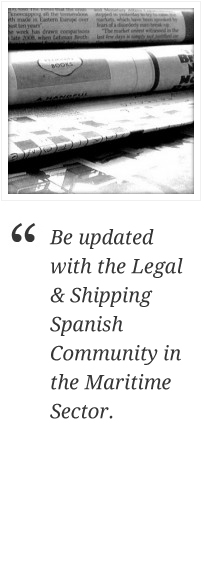December: CIRCULAR 7A/2003
CAPE FINISTERE NEW TRAFFIC SEPARATION SCHEME – SPANISH REFUGY PORTS ENTITLED TO REQUEST A GUARANTEE TO VESSEL OR CARGO INTERESTS – SPAIN AS A NEW PARTICULARY SENSITIVE SEA AREA
CAPE FINISTERE NEW TRAFFIC SEPARATION SCHEME . In its 49th Meeting the Sub-Committee on Safety of Navigation Committee (OMI, 49 NAV 2003) approved an amendment to existing CAPE FINISTERE TRAFFIC SEPARATION SCHEME (TSS) in order to move away from the coast the traffic of those vessels carrying dangerous or pollutant cargoes in bulk. Two north traffic lanes are established, as well as two south traffic lanes. Details of the traffic lanes can be seen at the website of the Spanish Ministry of Transport, www.mfom.es. Those vessels with dangerous or pollutant cargoes in bulk will have to use the most remote traffic lane according to the vessel’s direction. All vessels of the m/v PRESTIGE type will have to use the most remote traffic lane from the coast, 42 from the earth.
This amended traffic separation scheme will be submitted to the 23rd Assembly (taking place in November-December 2003) for adoption and will enter into force six months after adoption.
It should be noted that the non-compliance with the requirements of the Cape Finistere Traffic Separation Scheme, once in force, could be typified as an administrative infraction as per our Spanish Ports and Merchant Marine Law 27/1992 which regulates Sanctioning Proceedings, Infractions and Fines. Despite the fact that this law will be modified in January 2004, its chapter of administrative infringements will remain basically the same. If the non-compliant vessel is calling to a Spanish port, she could be detained as a preventive measure to guarantee the payment of the possible sanction once the final Resolution of the Sanctioning Proceeding has been adopted. The only way to release the vessel would be by providing a guarantee which does not include Club Letters. Vessels not complying with the requirements of this Separation Scheme could be even tugged to a northern Spanish port.
SPANISH REFUGY PORTS ENTITLED TO REQUEST A GUARANTEE TO VESSEL OR CARGO INTERESTS. In January 2004 a new domestic law entering into force will establish the possibility that the General Directorate of the Merchant Marine or the Harbour Master concerned can condition the authorisation to enter to a vessel in a refugee place in Spanish waters to the provision of a guarantee by the shipowner, operator or shipper to guarantee the possible damages that the vessel may cause.
SPAIN AS A NEW PARTICULARY SENSITIVE SEA AREA. The Sub-Committee on Safety Navigation Committee also approved by Resolution A.927 (22) the designation of PARTICULARLY SENSITIVE SEA AREAS – PSSAs (particularly sensitive and vulnerable to shipping disasters) for the European Atlantic Cost: Portugal, France, Belgium, UK, Ireland and Spain (Cantabria, Basque Country and specially protected Galicia). The vessels sailing in this area will be subject to measures such as a ban on single-hulled vessels (heavy fuel oils are to be transported only in double – hulled tankers), the designation of areas to be avoided or the requirement to ships to take recommended routes. Other measures could include requiring ships to have an experienced pilot on board when passing through these areas, mandatory reporting of transit, restrictions on vessels with a poor safety track record, or the banning of ships flying “flags of convenienceâ€, the obligation to notify to the authorities 48 hours before her arrival. The phasing – out is to be accelerated as follows: all tankers of the Erika and Prestige Category 1 may be operated only up to age of 23 years and no later than 2005.
The necessary investment of the Spanish government in order to adapt all the security equipments of Cape Finisterre Central Control to the new requirements such as better communication system, detection equipments and radar following, is calculated in 7 million Euros.
It is known that six Particularly Sensitive Sea Areas have been formally accepted by the IMO up to date: the Great Barrier Reef (Australia), the Sabana-Camaguey archipelago (Cuba), the Malpelo Island (Columbia), the Florida Keys (United States), the Wadden Sea (Denmark, Germany, the Netherlands) and Paracas (Peru). Two additional PSSAs will be accepted in June 2004: the Torres Strait (Australia and Papua-New Guinea) and the Western European waters (Belgium, the UK, Ireland, France, Spain and Portugal).
The aim of a network of Particularly Sensitive Sea Areas together with strict shipping regulations tailored for each area is to help reduce the impact of future oil spills and others.

